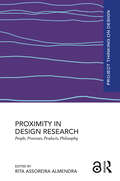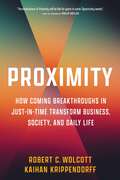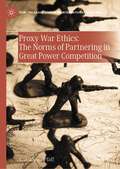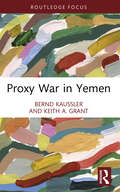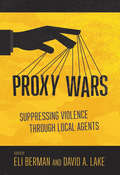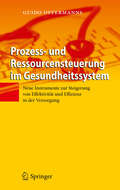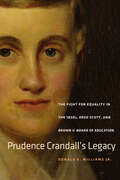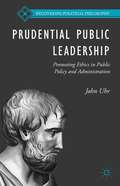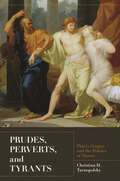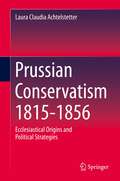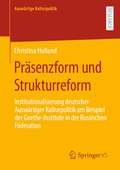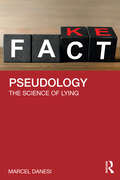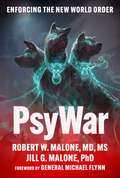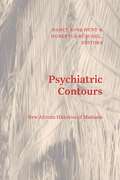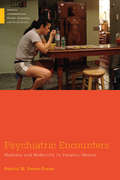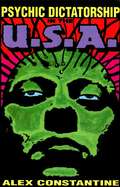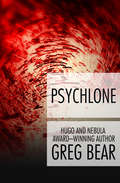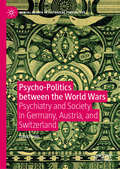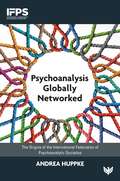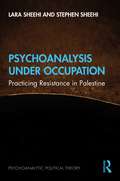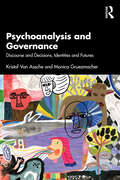- Table View
- List View
Proximity in Design Research: People, Processes, Products, Philosophy (Project Thinking on Design)
by Rita Assoreira AlmendraProximity in Design Research explores four constituents of design: people, processes, products and philosophy, and their potential to bridge contemporary gaps through multilevel synergies.The book brings together a variety of design approaches on several scales developed in the collaboration of different agencies and within diverse contexts. Proximity prompts us to explore the challenges and opportunities for research in design, with the widening and closing of distances in unpredictable times such as those during the COVID-19 pandemic. Despite the social distance imposed during this unprecedented global health scenario, researchers and professionals across different areas of knowledge have engaged in an extraordinary interdisciplinary and transdisciplinary global cooperation. This reinvented proximity enhanced the ability to cross fields, remove boundaries to collaboration between disciplines and accelerate processes towards an overarching goal: to overcome adversity. This edited collection reflects on what designers have taken from this experience so far and the possibilities that are foreseen as the concept of proximity is redefined.This book offers critical knowledge related to both design practice and design theory. It will be of interest to researchers, teachers and students working in the design disciplines.
Proximity: How Coming Breakthroughs in Just-in-Time Transform Business, Society, and Daily Life
by Kaihan Krippendorff Robert C. WolcottWhat if you could have whatever you want, produced and provided immediately and affordably no matter how customized—with minimal environmental impact? Products, services, and experiences on demand. Just-in-time anything, anywhere, anytime. This radical change is underway, as digital technologies push the production and provision of value ever closer to the moment of demand.Robert C. Wolcott and Kaihan Krippendorff provide an indispensable guide to the Proximity revolution, showing how it’s transforming every industry—and our lives. Offering unparalleled foresight for leaders and innovators, they reveal how pervasive this trend will be. Proximity represents an entirely new way to serve customers, with critical implications for corporate strategy, investing, public policy, supply chain resilience, and sustainability. Incremental changes to existing business models won’t suffice.Through interviews and compelling examples, Proximity shares stories of the people and companies leading the way. The book places rapidly advancing technologies—from generative AI and 3D printing to lab-grown meats, renewable energy, and virtual reality—in context and explores the factors accelerating the transformation.Proximity offers a playbook for business leaders, investors, and entrepreneurs to win this rapidly emerging game—and for each of us to consider the implications for our careers, families, communities, and lives.
Proxy War Ethics: The Norms of Partnering in Great Power Competition (Palgrave Studies in International Relations)
by C. Anthony PfaffWhile proxy relationships can be an effective means international actors use to transfer risk and lower their costs to compete, they also enable actors to circumvent international norms as well as create moral hazards that can make the practice self-defeating if not simply unethical. Applying the framework of the Just War Tradition, this book highlights some of these ethical gaps and addresses how proxy relationships introduce additional obligations for both sponsor and proxy. The author examines specific examples of how current precedents set a very high bar for accountability, and perversely incentivizes sponsors to employ proxies while discouraging any effort to moderate proxy behavior since that could imply effective control. In light of this, the book offers policy recommendations on how to best manage these relationships while maintaining certain moral commitments.
Proxy War in Yemen (Cass Military Studies)
by Keith A. Grant Bernd KausslerThis book analyzes the civil war in Yemen and how intervening external actors have shaped the trajectory of the conflict. The work examines the conflict in Yemen as a testing ground for expectations about the autonomy and control of proxies by external patrons and the direct consequences for civilian victimization and duration of war. Like other proxy wars, the international dimensions of the war made the conflict in Yemen subject to the geopolitical interests of intervening powers. The longstanding power rivalry between Saudi Arabia and Iran over Middle East supremacy resulted in a competitive intervention in Yemen, where the initial belligerents of the civil war—the Houthi and the Hadi regime—were used as proxies by Tehran and the Gulf coalition led by Riyadh, respectively. Their intervention ultimately translated into a prolonged and destructive conflict. The often contradictory and self-interested patronage strategies by the coalition’s two central patrons, Saudi Arabia and the United Arab Emirates, undermined their broader goal of containing Iran. However, Iran’s support for the Houthis enabled them to bait and bleed the Gulf coalition. Lastly, in an effort to balance against Iran, the United States underwrote the military campaign of the Gulf states with military hardware and personnel, thereby further prolonging the conflict and humanitarian disaster. This book concludes that intervention by external patrons both protracted the civil war and made it far more destructive for the civilian population. This book will be of much interest to students of proxy wars, Middle Eastern conflict, and security studies in general.
Proxy War: The Least Bad Option
by Tyrone L. GrohThe U.S. has indirectly intervened in international conflicts on a relatively large scale for decades. Yet little is known about the immediate usefulness or long-term effectiveness of contemporary proxy warfare. In cases when neither direct involvement nor total disengagement are viable, proxy warfare is often the best option, or, rather, the least bad option. Tyrone L. Groh describes the hazards and undesirable aspects of this strategy, as well as how to deploy it effectively. Proxy War explores the circumstances under which indirect warfare works best, how to evaluate it as a policy option, and the possible risks and rewards. Groh offers a fresh look at this strategy, using uncommon and understudied cases to test the concepts presented. These ten case studies investigate and illustrate the different types and uses of proxy war under varying conditions. What arises is a complete theoretical model of proxy warfare that can be applied to a wide range of situations. Proxy war is here to stay and will likely become more common as players on the international stage increasingly challenge U.S. dominance, making it more important than ever to understand how and when to deploy it.
Proxy Wars: Suppressing Violence through Local Agents
The most common image of world politics involves states negotiating, cooperating, or sometimes fighting with one another; billiard balls in motion on a global pool table. Yet working through local proxies or agents, through what Eli Berman and David A. Lake call a strategy of "indirect control," has always been a central tool of foreign policy. Understanding how countries motivate local allies to act in sometimes costly ways, and when and how that strategy succeeds, is essential to effective foreign policy in today's world. In this splendid collection, Berman and Lake apply a variant of principal-agent theory in which the alignment of interests or objectives between a powerful state and a local proxy is central. Through analysis of nine detailed cases, Proxy Wars finds that: when principals use rewards and punishments tailored to the agent's domestic politics, proxies typically comply with their wishes; when the threat to the principal or the costs to the agent increase, the principal responds with higher-powered incentives and the proxy responds with greater effort; if interests diverge too much, the principal must either take direct action or admit that indirect control is unworkable. Covering events from Denmark under the Nazis to the Korean War to contemporary Afghanistan, and much in between, the chapters in Proxy Wars engage many disciplines and will suit classes taught in political science, economics, international relations, security studies, and much more.
Prozess- und Ressourcensteuerung im Gesundheitssystem
by Guido OffermannsIn dem Buch werden aktuelle Fragen der Steuerung im Gesundheitssystem thematisiert. Ein Bezugsrahmen für notwendige Veränderungen wird beschrieben und daraus Anforderungen an ein modernes Krankenhausmanagement abgeleitet. Zudem wird die Wirksamkeit unterschiedlicher Qualitätsmodelle untersucht und ein Konzept zur Entwicklung von Gesundheitszielen mit Blick auf Prävention und Gesundheitsförderung geliefert. Leitmotiv ist hierbei die Steigerung der Wertschöpfung für Patienten sowie die Befähigung der Mitarbeiter, bestmögliche Qualität zu bieten.
Prudence Crandall's Legacy: The Fight for Equality in the 1830s, Dred Scott, and Brown v. Board of Education (The Driftless Connecticut Series)
by Donald E. WilliamsThe &“compelling and lively&” story of a pioneering abolitionist schoolteacher and her far-reaching influence on civil rights and American law (Richard S. Newman, author of Freedom&’s Prophet). When Prudence Crandall, a Canterbury, Connecticut schoolteacher, accepted a black woman as a student, she unleashed a storm of controversy that catapulted her to national notoriety, and drew the attention of the most significant pro- and anti-slavery activists of the early nineteenth century. The Connecticut state legislature passed its infamous Black Law in an attempt to close down her school. Crandall was arrested and jailed—but her legal legacy had a lasting impact. Crandall v. State was the first full-throated civil rights case in U.S. history. The arguments by attorneys in Crandall played a role in two of the most fateful Supreme Court decisions, Dred Scott v. Sandford, and the landmark case of Brown v. Board of Education. In this book, author and lawyer Donald E. Williams Jr. marshals a wealth of detail concerning the life and work of Prudence Crandall, her unique role in the fight for civil rights, and her influence on legal arguments for equality in America that, in the words of Brown v. Board attorney Jack Greenberg, &“serves to remind us once more about how close in time America is to the darkest days of our history.&” &“The book offers substantive and well-rounded portraits of abolitionists, colonizationists, and opponents of black equality―portraits that really dig beneath the surface to explain the individuals&’ motivations, weaknesses, politics, and life paths.&” ―The New England Quarterly &“Taking readers from Connecticut schoolrooms to the highest court in the land, [Williams] gives us heroes and villains, triumph and tragedy, equity and injustice on the rough road to full freedom.&” —Richard S. Newman, author of Freedom&’s Prophet
Prudential Public Leadership
by John UhrDemocratic systems of public administration draw on various schools of political leadership to promote administrative ethics and public responsibility. Contemporary public administrators justify their public leadership through a blend of ethics around pragmatism (Mill's utilitarianism), principle (Kant's deontology or duty-based ethics) and prudence (Aristotle's ethical and political theory). Prudential Public Leadership brings Aristotle back into the front rank of studies of administrative leadership, based in part on the now-neglected reliance on Aristotle by the innovators who shaped the system of democratic public administration in the late nineteenth century.
Prudes, Perverts, and Tyrants: Plato's Gorgias and the Politics of Shame
by Christina H. TarnopolskyIn recent years, most political theorists have agreed that shame shouldn't play any role in democratic politics because it threatens the mutual respect necessary for participation and deliberation. But Christina Tarnopolsky argues that not every kind of shame hurts democracy. In fact, she makes a powerful case that there is a form of shame essential to any critical, moderate, and self-reflexive democratic practice. Through a careful study of Plato's Gorgias, Tarnopolsky shows that contemporary conceptions of shame are far too narrow. For Plato, three kinds of shame and shaming practices were possible in democracies, and only one of these is similar to the form condemned by contemporary thinkers. Following Plato, Tarnopolsky develops an account of a different kind of shame, which she calls "respectful shame." This practice involves the painful but beneficial shaming of one's fellow citizens as part of the ongoing process of collective deliberation. And, as Tarnopolsky argues, this type of shame is just as important to contemporary democracy as it was to its ancient form. Tarnopolsky also challenges the view that the Gorgias inaugurates the problematic oppositions between emotion and reason, and rhetoric and philosophy. Instead, she shows that, for Plato, rationality and emotion belong together, and she argues that political science and democratic theory are impoverished when they relegate the study of emotions such as shame to other disciplines.
Prussian Conservatism 1815-1856: Ecclesiastical Origins and Political Strategies
by Laura Claudia AchtelstetterThe book examines the nexus between political and religious thought within the Prussian old conservative milieu. It presents early-nineteenth-century Prussian conservatism as a phenomenon connected to a specific generation of young Prussians. The book introduces the ecclesial-political ‘party of the Evangelische Kirchenzeitung’ (EKZ), a religious party within the Prussian state church, as the origins of Prussia’s conservative party post-1848. It traces the roots of the EKZ party back to the experiences of the Napoleonic Wars (1806-15) and the social movements dominant at that time. Additionally, the book analyses this generation’s increasing politicization and presents the German revolution of 1848 and the foundation of Prussia’s first conservative party as the result of a decade-long struggle for a religiously-motivated ideal of church, state, and society. The overall shift from church politics to state politics is key to understanding conservative policy post-1848. Consequently, this book shows how conservatives aimed to maintain Prussia’s character as a Christian and monarchical state, while at the same time adapting to contemporary political and social circumstances. Therefore, the book is a must-read for researchers, scholars, and students of Political Science and History interested in a better understanding of the origins and the evolution of Prussian conservatism, as well as the history of political thought.
Präsenzform und Strukturreform: Institutionalisierung deutscher Auswärtiger Kulturpolitik am Beispiel der Goethe-Institute in der Russischen Föderation (Auswärtige Kulturpolitik)
by Christina HollandDie Untersuchung will einen wissenschaftlichen Beitrag zum Thema deutsche Auswärtige Kulturpolitik im Allgemeinen leisten. Mit dem Schwerpunkt der Kulturinstitute des Goethe-Instituts im Ausland wird ein Thema in den Fokus gerückt, das bereits vielfach diskutiert worden ist, allerdings meist unter dem Aspekt der programmatischen Inhaltsanalyse und weniger unter dem Aspekt der Institutionalisierung. Christina Holland untersucht in diesem Buch die Auswärtige Kulturpolitik unter dem Blickwinkel der festen kulturellen Infrastruktur anhand einer SWOT-Analyse am Beispiel der Kulturinstitute des Goethe-Instituts in der Russischen Föderation.
Prävention von Extremismus, Radikalisierung und Terrorismus: Grundlagen, internationale Praxis und Evaluation von psychosozialen Programmen
by Friedrich Lösel Irina Jugl-Kuntzsch Sonja King Doris BenderPolitisch, religiös, ethnisch oder anders motivierter Extremismus und gewaltorientierte Radikalisierung sind gravierende Probleme. Es gibt viele Aktivitäten zur Prävention, über deren Wirksamkeit man aber zu wenig weiß. Die Autoren berichten über ihre Forschungen zu protektiven Faktoren gegen Extremismus, Praxisprojekten aus 31 Ländern und zur Evaluation von psychosozialen Präventionsprogrammen. Grundbegriffe, Theorien, Methodenprobleme und Risikofaktoren werden erörtert. Es zeigen sich etliche ermutigende Ergebnisse, vor allem in der primären Prävention bei jungen Menschen sowie in tertiären Ansätzen zum Ausstieg. Positive Effekte bestehen bei kurzfristigen Änderungen in Einstellungen und Denkmustern. Deutlich wird aber, dass mehr kontrollierte Evaluationen zu langfristigen Effekten im Verhalten nötig sind. Abschließend werden Vorschläge für die Forschung, Politik und Praxis gemacht. Durch seine empirische Orientierung liefert der Band Grundlagen für eine sachliche und weniger „spalterische&“ Diskussion der Thematik.
Pseudo-Public Spaces in Chinese Shopping Malls: Rise, Publicness and Consequences (Routledge Complex Real Property Rights Series)
by Yiming WangShopping malls in China create a new pseudo-public urban space which is under the control of private or quasi-public power structure. As they are open for public use, mediated by the co-mingling of private property rights and public meanings of urban space, the rise, publicness and consequences of the boom in the construction of shopping malls raises major questions in spatial political economy and magnifies existing theoretical debates between the natural and conventional schools of property rights. In examining these issues this book develops a theoretical framework starting with a critique of the socio-spatial debate between two influential bodies of work represented by the work of Henri Lefebvre and David Harvey. Drawing on the framework, the book examines why pseudo-public spaces have been growing so rapidly in China since the 1980s; assesses to what degree pseudo-public spaces are public, and how they affect the publicness of Chinese cities; and explores the consequences of their rise. Findings of this book provide insights that can help to better understand Chinese urbanism and also have the potential to inform urban policy in China. This book will be of interest to academics and researchers in both Chinese studies and urban studies.
Pseudology: The Science of Lying
by Marcel DanesiIn an age where fake news, conspiracy theories, and outright lies by political and cultural leaders are commonplace, we may be becoming accustomed to lying, or worse, even immune to it. Pseudology unravels the reasons for this by describing a “science of lying” that looks at various aspects of this trait, from how it affects the brain to how it distorts perception.Interest in lying goes back to antiquity and writing and debate has only increased in the present day, but what is missing is a treatment that synthesizes the work from linguists, political scientists, anthropologists, psychologists, neuroscientists, and sociologists, tying them to the philosophical and literary views of lying throughout history. Such a treatment can be called "pseudology": an interdisciplinary science for classifying, collating, and assessing ideas about lying. This book is a comprehensive treatment of pseudology, emphasising the importance of studying lying in our current climate. Pseudology addresses questions such as:• What is a lie?• Why do we lie?• Why are we so susceptible to lying?• How does lying activate false beliefs and generate hatred of others?• How has lying shaped the course of history (at least to some extent)?• How has lying been adopted as a basic thematic element in literature and the arts?Synthesising research from a broad range of disciplines and from the perspective of a leading cognitive linguist, this text weaves ideas and theories about lying cohesively into an overall interdisciplinary science. This landmark book is vital for students and scholars of language as well as anyone interested in politics, sociology, or psychology.
PsyWar: Enforcing the New World Order
by Robert W. Malone Jill Glasspool MalonePsyWar: Enforcing the New World Order exposes the history and tactics of modern psychological warfare on the American people and offers a way forward for citizens to resist totalitarian control. PsyWar is when a government coordinates and directs deployment of propaganda, censorship, and psychological operations (psyops) tools in campaigns designed to manipulate public opinion. The authors address critical topics including: Propaganda and Behavioral Control Psychological Bioterrorism Deep State Censorship Surveillance Capitalism Administrative State Objectives Fifth-Generation Warfare PsyWar Tactics Techno-Totalitarianism The New World Order and Global Control Free speech is the most pragmatic tool we have for ascertaining truth. Only by examining all sides of an issue can the truth be chiseled out like a statue out of marble. We must defend all speech—whether untrue, hateful, or intolerable, as that is the only way to protect our right to understand the world. As soon as free speech is restricted, that restriction will be used to sway public opinion. Now is a time when America needs hope. But more than hope, we need to restore our Constitution and Bill of Rights as the foundational documents of our Republic. These documents support and protect our personal sovereignty and are at the core of our fundamental rights as Americans. We must work to make this country great again by restoring our commitment to these foundational principles and ethics.
Psychiatric Contours: New African Histories of Madness (Theory in Forms)
by Nancy Rose Hunt & Hubertus BüschelPsychiatric Contours investigates new histories of psychiatry, derangement, and agitated subjectivities in colonial and decolonizing Africa. The volume lets the multivalent term madness broaden perception, well beyond the psychiatric. Many chapters detect the mad or the psychiatric in unhinged persons, frantic collectives, and distressing situations. Others investigate individuals suffering from miscategorization. A key Foucauldian word, vivacity, illuminates how madness aligns with pathology, creativity, turbulence, and psychopolitics. The archives, patient-authored or not, speak to furies and fantasies inside asylums, colonial institutions, decolonizing missions, and slave ships. The frayed edges of politicized deliria open up the senses and optics of psychiatry’s history in Africa far beyond clinical spaces and classification. The volume also proposes fresh concepts, notably the vernacular, to suggest how to work with emic clues in a granular fashion and telescope the psychiatric within histories of madness. With chapters stretching across much of ex-British and ex-French colonial Africa, Psychiatric Contours attends to the words, autobiographies, and hallucinations of the stigmatized and afflicted as well as of the powerful. Expatriate psychiatrists with cameras, prying authorities, fearful missionaries, and colonial anthropologists enter these readings beside patients, asylums, and boarding schools via research on possession “hysteria” and schizophrenia. In brief, this book demonstrates novel ways of writing not only medical history but all subaltern and global histories.Contributors. Hubertus Büschel, Raphaël Gallien, Matthew M. Heaton, Richard Hölzl, Nancy Rose Hunt, Richard C. Keller, Sloan Mahone, Nana Osei Quarshie, Jonathan Sadowsky, Romain Tiquet
Psychiatric Encounters: Madness and Modernity in Yucatan, Mexico (Medical Anthropology)
by Beatriz M. Reyes-FosterPsychiatric Encounters presents an intimate portrait of a public inpatient psychiatric facility in the Southeastern state of Yucatan, Mexico. The book explores the experiences of patients and psychiatrists as they navigate the challenges of public psychiatric care in Mexico. While international reports condemning conditions in Mexican psychiatric institutions abound, Psychiatric Encounters considers the large- and small-scale obstacles to quality care encountered by doctors and patients alike as they struggle to live and act like human beings under inhumane conditions. Beatriz Mireya Reyes-Foster closely examines the impact of the Mexican state’s neoliberal health reforms on how patients access care and doctors perform their duties. Engaging with madness, modernity, and identity, Psychiatric Encounters considers the enduring role of colonialism in the context of Mexico's troubled contemporary mental health care institutions.
Psychic Dictatorship in the U.S.A.
by Alex ConstantineBombing minds rather than bodies is the warfare of the new millennium. This book uncovers the terrifying extent of electromagnetic and biotelemetric mind control experimentation on involuntary human subjects."The evidence presented in this book is a savage indictment of democracy-turned-dictatorship. The sordid truth about what really goes on in the halls of power is often too much to take, but it does help to have some idea of what we're up against." -- Nexus
Psychische Belastungen bei Klient*innen der Deradikalisierungs- und Distanzierungsarbeit: Extremismusprävention an der Schnittstelle von Therapie und Beratung (Ideologie und Gewalt - Schriften zur Deradikalisierung)
by Thomas Mücke Vera Dittmar„Attentäter seit Jahren psychisch auffällig – Terror, Wahnsinn oder beides?&“ Immer wieder finden nach einem Attentat solche Überschriften mit Hinweisen auf extremistische Denkmuster und psychische Auffälligkeiten ein mediales öffentliches Interesse. In der Wissenschaft beschäftigt man sich schon seit längerem mit verschiedenen Faktoren, welche zu Extremismus führen können. Dabei erhält der Zusammenhang von Radikalisierung, Extremismus und psychischen Erkrankungen eine konstante Aufmerksamkeit. In der Praxis werden Psychotherapeut*innen zunehmend mit Fragen der Extremismusprävention konfrontiert. Nach einem Attentat, bei dem der Täter*die Täterin stirbt oder im Rahmen der Strafverfolgung schweigt, lassen sich oft nur retrospektiv Ursachen rekonstruieren. Einen Einblick in das aktuelle Verhalten von radikalisierten Personen können hingegen Berater*innen von Distanzierungs- und Ausstiegsprogrammen bekommen: entweder bereits in der Phase der Radikalisierung indirekt durch Angehörige oder während des Distanzierungsprozesses in der direkten Beratung der Indexklient*innen. Immer wieder begegnen die Berater*innen dabei Menschen, die sie als psychisch belastet einschätzen. Die Distanzierungsberatung und die Psychotherapie bilden somit eine wichtige Schnittstelle. Der Sammelband vereint Erkenntnisse pädagogischer, therapeutischer und behördlicher Praxis sowie wissenschaftlicher Reflektion. Zudem wird die analytische Betrachtung von psychisch auffälligen Klient*innen mit der vertieften Diskussion von Good-Practice-Beispielen aus Fachberatung und Traumatherapie kombiniert. Dabei werden sowohl Patient*innen der Psychotherapie mit extremistischen Einstellungen als auch Klient*innen der Distanzierungsberatung mit psychischen Auffälligkeiten mitgedacht. Der Phänomenbereich Islamismus bildet hierbei den Rahmen, aber berücksichtigt auch phänomenübergreifende Perspektiven.
Psychlone (Gollancz S. F. Ser.)
by Greg BearAn evil spawned from the horrors of World War II wreaks havoc on a small New Mexico town in this novel from the &“master of the grand-scale SF novel&” (Booklist). Curiosity may kill Larry Fowler. A scientist from New Mexico, Fowler is hot on the trail of a mysterious phenomenon that is known to freeze animals instantly and can demolish an entire town. Part ghost story, part science fiction, part political treatise, Greg Bear's novel tracks Fowler on his journey to discover the true nature of the PSYCHLONE.
Psycho-Politics between the World Wars: Psychiatry and Society in Germany, Austria, and Switzerland (Mental Health in Historical Perspective)
by David FreisThis book is about the psycho-political visions and programmes in early-twentieth century Germany, Austria, and Switzerland. Amidst the political and social unrest that followed the First World War, psychiatrists attempted to use their clinical insights to understand, diagnose, and treat society at large. The book uses a variety of published and unpublished sources to retrace major debates, protagonists, and networks involved in the redrawing of the boundaries of psychiatry’s sphere of authority. The book is based on three interconnected case studies: the overt pathologisation of the 1918/19 revolution led by right-wing German psychiatrists; the project of medical expansionism under the label of ‘applied psychiatry’ in inter-war Vienna; and the attempt to unite and implement different approaches to psychiatric prophylaxis in the movement for mental hygiene. By exploring these histories, the book also sheds light on the emergence of ideas that still shape the field to the present day and shows the close connection between utopian promises and the worst abuses of psychiatry.
Psychoanalysis Globally Networked: The Origins of the International Federation of Psychoanalytic Societies (International Federation of Psychoanalytic Societies Series)
by Andrea HuppkeThis enlightening volume examines the origins and development of the International Federation of Psychoanalytic Societies (IFPS). It investigates how its structure and concept differed from other societies, and how the autonomy of IFPS members has remained fundamental from its inception up to the present day.
Psychoanalysis Under Occupation: Practicing Resistance in Palestine (Psychoanalytic Political Theory)
by Stephen Sheehi Lara SheehiHeavily influenced by Frantz Fanon and critically engaging the theories of decoloniality and liberatory psychoanalysis, Lara Sheehi and Stephen Sheehi platform the lives, perspectives, and insights of psychoanalytically inflected Palestinian psychologists, psychiatrists, and other mental health professionals, centering the stories that non-clinical Palestinians have entrusted to them over four years of community engagement with clinicians throughout historic Palestine. Sheehi and Sheehi document the stories of Palestinian clinicians in relation to settler colonialism and violence but, even more so, in relation to their patients, communities, families, and one another (as a clinical community). In doing so, they track the appearance of settler colonialism as a psychologically extractive process, one that is often effaced by discourses of "normalization," "trauma," "resilience," and human rights, with the aid of clinicians, as well as psychoanalysis. Psychoanalysis Under Occupation: Practicing Resistance in Palestine unpacks the intersection of psychoanalysis as a psychological practice in Palestine, while also advancing a set of therapeutic theories in which to critically engage and "read" the politically complex array of conditions that define life for Palestinians living under Israeli occupation.
Psychoanalysis and Governance: Discourse and Decisions, Identities and Futures
by Kristof Van Assche Monica GruezmacherPsychoanalysis and Governance makes a cogent argument for the use of psychoanalytic perspectives in the understanding of governance, the process of collective decision-making that maintains and reshapes communities.This book is highly relevant to those interested in the ever-expanding field of applications of psychoanalysis and for all those willing to observe the discursive and affective underpinnings of public policy, administration, and planning. It locates the potential for self-analysis and self-transformation within governance, yet also indicates governance as the confluence of diverging understandings of the ideas of community and governance itself, as the place where competing desires and variegated patterns of fears and hopes collide and hold the transformational potential to destabilize the community.Building on Freudian, Lacanian, and other psychoanalytic traditions, the book enriches our understanding of governance, the way communities remember and forget, are haunted by the past, remain untransparent to themselves yet also retain the possibility of reinvention, of imagining alternative selves, new futures, and discover paths to move in that direction. This book will be a suitable for psychoanalysts, planners, and all those interested in informed governance.
